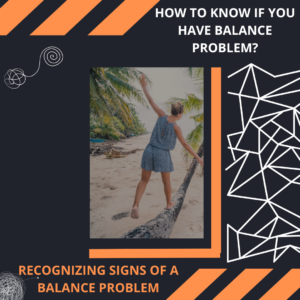“Happiness is not a matter of intensity but of balance and order and rhythm and harmony.” – Thomas Merton
Balance problems refer to difficulties maintaining stability and equilibrium. They can range from a mild unsteadiness to severe balance impairments. People with balance problems may experience dizziness, vertigo (a spinning sensation), unsteadiness while standing or walking, and an increased risk of falls. Balance issues can arise from conditions affecting the inner ear (such as vestibular disorders), neurological conditions, musculoskeletal problems, medication side effects, or systemic illnesses.
It’s important to note that clumsiness and balance problems can often be interconnected. When someone has poor balance, it can lead to a higher likelihood of clumsiness due to the challenge of maintaining stability during movements.
If you suspect that you may have clumsiness or a balance problem, here are some signs and symptoms to look out for:
- Frequent Tripping or Falling: If you find yourself tripping or falling more often than others, especially during routine activities or on even surfaces, it could be an indication of a balance issue.
- Difficulty with Coordination: If you struggle with tasks that require precise movements or hand-eye coordination, such as catching a ball, threading a needle, or navigating obstacles, it may suggest a coordination problem related to balance.
- Dizziness or Vertigo: Experiencing dizziness, a spinning sensation, or a feeling of lightheadedness can be associated with balance problems. This can occur when standing up too quickly, changing positions, or during specific activities.
- Unsteadiness or Loss of Balance: Feeling unstable or unsteady on your feet, as if you might fall, even when standing or walking on level ground, may indicate a balance issue.
Difficulty Walking: If you have trouble walking in a straight line, maintaining a steady pace, or coordinating your steps, it could be a sign of an underlying balance problem.
Sensation of Floating or Drifting: Some individuals with balance problems report feeling as if they are floating or drifting while walking, as if they are not fully in control of their movements. - Muscle Weakness or Poor Muscle Control: Weakness or poor muscle control, especially in the legs and core, can contribute to balance problems. If you struggle to maintain stability or have difficulty controlling your movements, it may indicate an issue.
- History of Falls or Near Falls: If you have a history of falling or experiencing near falls, it is important to investigate the underlying causes, including potential balance problems.
If you recognize any of these signs or symptoms, it is recommended to consult with a healthcare professional, such as a physical therapist, an otolaryngologist, or your primary care physician. They can evaluate your condition, perform relevant tests and assessments, and provide appropriate guidance or refer you to a specialist if necessary.
Don’t ignore potential balance problems! Learn to recognize the signs and take action for improved stability and well-being. Consult with a healthcare professional or balance specialist to assess your condition and receive tailored guidance and treatment options. Prioritize your balance and stay steady on your feet.
If you have any questions or prevention techniques you can give us a call so that we can help you please contact us and we will get back to you as soon as possible visit our website at: https://elite-musclerecovery.com/ please call us: 📞423-664-8452



